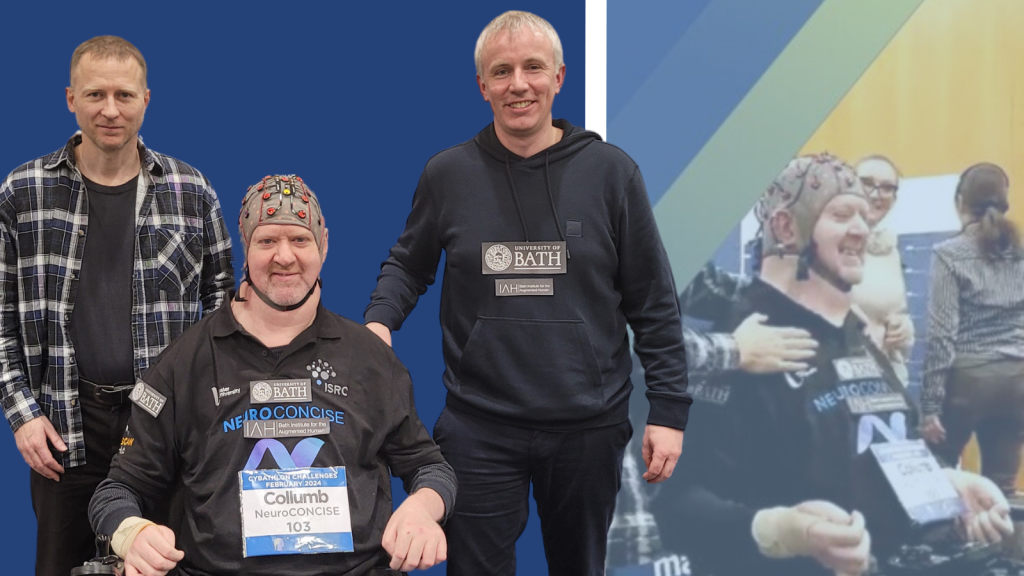Bath Team Uses ‘Mind Control’ to Win International Athletics Competition
Technology developed by a team led by the University of Bath has enabled a cybathlete with major spinal injuries to control a computer using brainwaves alone and take first prize in the global CYBATHLON Challenge.
An international competition where cybathletes race against each other using their brainwaves alone has been won by a team led by the University of Bath.
The victory is shared between the team ‘pilot’ and the scientists who developed the technology that enabled him to compete without moving any part of his body.
 The brain-computer interface (BCI) race was one of six races held last week as part of the global CYBATHLON Challenge. It involved pilot Owen Collumb – a spinal-injury athlete based in Dublin, Ireland – using ‘movement imagination’ and imagery, along with deep mental focus, to complete a number of computer game-like challenges.
The brain-computer interface (BCI) race was one of six races held last week as part of the global CYBATHLON Challenge. It involved pilot Owen Collumb – a spinal-injury athlete based in Dublin, Ireland – using ‘movement imagination’ and imagery, along with deep mental focus, to complete a number of computer game-like challenges.
The technology that enables this brainwave control was invented by University of Bath scientists who research and develop headsets that can act as interfaces between the human brain and computers.
Recommended AI Interview: The Future of Manufacturing: Industrial Generative AI and Digital Twins
The winning team – named NeuroCONCISE – is a collaboration between the Bath Institute of the Augmented Human (IAH) at the University of Bath and Ulster University’s Spatial Computing and Neurotechnology Innovation Hub.
It is led by Professor Damien Coyle, head of IAH and Turing AI Fellow, who said: “This victory has been possible thanks to the great determination and of course skills of our team. Our cutting-edge research, combined with intense training of our pilot, gave Owen the chance to showcase remarkably accurate brain-activated commands and control, without physical movement.”
NeuroCONCISE has entered the CYBATHLON Challenge four times since 2016. “This year’s achievement marks a significant milestone for the team, having shown steady progress from their third place finishes in previous years to emerge as champions in 2024,” said Professor Coyle.
The team is affiliated with the company NeuroCONCISE, which was established in 2016 by Professor Coyle to develop high-precision neurotechnology. The company creates wearable electroencephalography (EEG) headsets (similar to the headsets used in medicine to record the electrical activity of the brain) that can be used to assist people in everyday life, sport and medicine.
It is hoped that, in time, this technology will enable a person with tetraplegia or locked-in syndrome to autonomously steer a wheelchair, control a robotic manipulator or use a smartphone, improving the autonomy and social participation of people with severe physical disabilities. The tech also shows promise for helping people with their cognitive and physical rehabilitation, for instance, following a stroke.
Recommended AI Interview: HealthTech and SportsTech Applications: Stepping up AI Capabilities with Investments in 2024
Winning team
For the CYBATHLON challenge, Mr Collumb wore an EEG headset linked to a sophisticated AI/signal-processing computer that translated his imagined hand and arm movements into a range of control commands. These commands were then sent to a virtual avatar in order to complete a sequence of complex tasks in record time (4.44 minutes).
One task involved Mr Collumb guiding a wheelchair through a room where it had to avoid obstacles and then leave through the exit. Another involved him steering a mechanical arm holding a cup towards an ice dispensing machine. The task was complete when the cup sat directly beneath the water outlet and all ice was collected by the cup. A third task and final task involved selecting an option out of several in a menu system. Each task had to be completed twice in 6 minutes.
Succeeding in these tasks was a truly remarkable feat for Mr Collumb, who suffered a spinal injury 20 years ago that left him almost completely paralysed from the chest down. He said: “CYBATHLON has opened many opportunities for me. I was a keen sportsman before my injury and am delighted to have been able to compete and win in this fantastic competition.” He added: “The research by Professor Coyle and the rest of the team has had a major impact on my life and wellbeing.”
To be close to Mr Collumb’s home, NeuroCONCISE joined the CYBATHLON Challenge remotely, from the Movement Analysis Laboratory at University College Dublin, and was livestreamed to the main arena in Zurich, Switzerland.
As part of his preparation for the competition, Mr Collumb spent many hours training with Professor Coyle and Dr Attila Korik, the team’s race engineer and a researcher from the Department of Computer Science at Bath. He also received expert advice from Dr Lee Moore, a sports-performance psychologist.
Recommended AI Interview: McAfee at CES 2024: Deepfake Audio Detection Technology using AI
[To share your insights with us as part of editorial or sponsored content, please write to sghosh@martechseries.com]








Comments are closed.